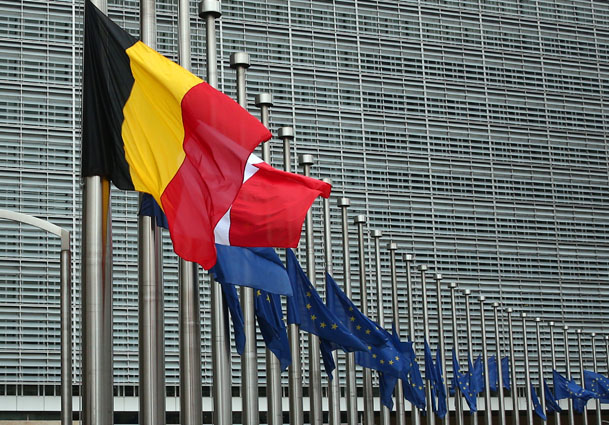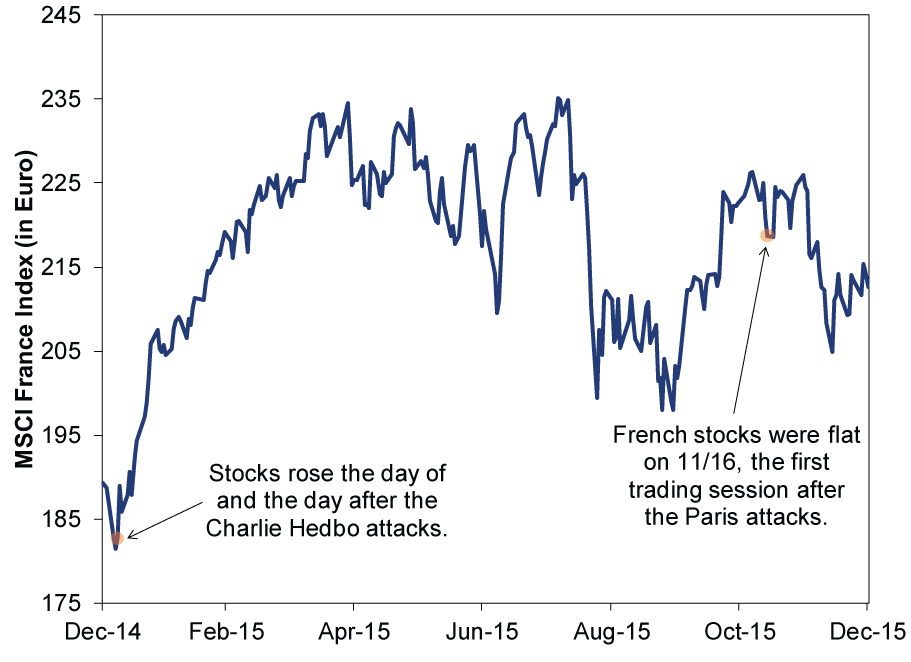Personal Wealth Management / Market Analysis
Terrorism Still Won’t Succeed
Free people and free markets will overcome the horrific attacks in Brussels.
Photo by Carl Court/Getty Images Europe.
Just four months after Paris was rocked by an attack, terrorists have struck another European capital: Brussels, Belgium. We are sorry to have to write this type of article again, since it gives the terrorists too much credit by drawing attention to their senseless acts of depravity. Times like this call for prayers, aid and justice for the victims-and, in light of the many articles attributing stocks' decline Tuesday to the attacks, a timely reminder that terrorism's impact on stocks is fleeting, at most. The collective power of free people and free markets will always overcome those who wish to stop them. The terrorists aim to take that away, but they will fail.
As you've likely heard by now, terrorists carried out two attacks in Brussels Tuesday morning: one at Brussels' main international airport, the other at Maelbeek subway station, not far from many EU institutions. ISIS claimed responsibility for the attacks, which killed more than 30 and wounded over 230-the deadliest terror attack in Belgian history. While this despicable act has forever altered the lives of the victims and their families and loved ones, it is sadly yet another chapter in a litany of recent terrorism. Look at the past 12 years: The 2004 Spanish train bombings killed 191 people. The 2005 London bombings claimed 52 lives. 85 perished in the 2011 Norway shootings. There are all-too-frequent cases of violence in the Middle East and Africa. The US suffered the Boston Marathon bombings and the recent San Bernardino shootings. Paris suffered two big attacks last year, one aimed at staff of the satirical magazine Charlie Hebdo and a kosher market, the other at popular spots throughout the city, claiming more than 100 lives between the two.
As scary and damaging as terrorism is, its impact on stocks is fleeting. Consider September 11, 2001, the biggest act of terrorism on US soil. In response to the attack, US markets closed and remained closed until September 17. Though stocks fell sharply once markets reopened, they also rebounded to the prior September 10 levels 19 trading days later-all during a larger bear market. This bear, which originated from the 2000 Tech bubble bursting, was already a year and a half old, disproving any theory that the terrorists caused the extended market decline. French stocks were similarly resilient in a tragedy-filled 2015. (Exhibit 1)
Exhibit 1: MSCI France in 2015
Source: FactSet, as of 3/22/2016. MSCI France Index with gross dividends, 12/31/2014 - 12/31/2015.
It may seem a bit counterintuitive. Why would stocks rise after a horrific event? Because, for better or worse, terrorism's market surprise power has been diminishing. While the human toll is substantial-and we don't discount its impact-terrorism also doesn't possess the type of power necessary to derail markets. The news of a terrorist attack may broadly knock stocks initially, but history has shown markets can bounce back fast-even the same day. While the US' S&P 500 and MSCI EMU were both down a bit (-0.1% and -0.2%, respectively), the MSCI Belgium was actually up 0.4%.[i] Though an unfortunate commentary on our times, acts of terrorism aren't incredibly shocking anymore, as investors have become more desensitized to the news. With weakening surprise power, terrorism doesn't come close to providing the shock that can wipe trillions off global GDP-the type of wallop that can start a bear market. As scary as attacks may be, don't let the potential uncertainty and bombastic headlines shake you from your long-term investment strategy.
Many are also speculating about Brussels' political implications. In the US, some wonder what impact will this have on the Presidential election. In Europe, many wonder how these events will affect the UK's forthcoming "Brexit" referendum and the Continent's visa-free travel area, known as the Schengen zone. All are worth considering, and markets do care about these issues. But the debate here is predominantly sociological, which markets tend to see through. Politicians using tragedy as a wedge issue, unfortunately, is a fact of life. Moreover, speculating on how one isolated event will impact political developments that will unfold over several months is always fraught with peril. It's simplistic and dangerous to presume Event A automatically brings Impact B. There are too many other variables at work. Keep an eye on these issues, for sure, but feel free to tune out the grandstanding.
As pessimistic as this may sound, Belgium isn't the first place to be hit by terrorism, and it won't be the last. However, what we will say is that history shows the power of free people and free markets will overwhelm those who try and inflict ill upon them. We have every reason to believe this trend will continue.
[i] Source: FactSet, as of 3/23/2016. S&P 500 total return, MSCI EMU and MSCI Belgium with net dividends (in USD) for 3/22/2016.
If you would like to contact the editors responsible for this article, please message MarketMinder directly.
*The content contained in this article represents only the opinions and viewpoints of the Fisher Investments editorial staff.
Get a weekly roundup of our market insights
Sign up for our weekly e-mail newsletter.

You Imagine Your Future. We Help You Get There.
Are you ready to start your journey to a better financial future?

Where Might the Market Go Next?
Confidently tackle the market’s ups and downs with independent research and analysis that tells you where we think stocks are headed—and why.







